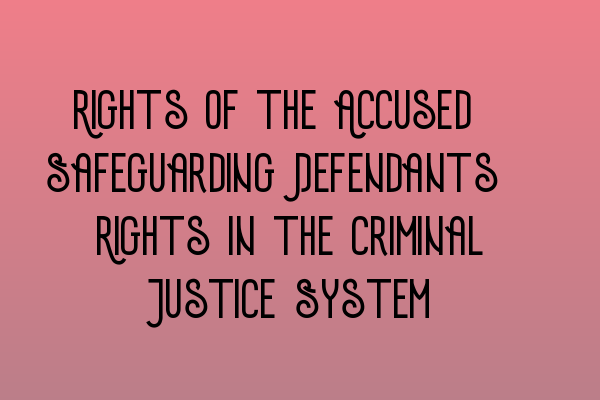Rights of the Accused: Safeguarding Defendants’ Rights in the Criminal Justice System
In the criminal justice system, every individual is presumed innocent until proven guilty. This fundamental principle ensures that the rights of the accused are protected throughout the legal process. The rights of the accused encompass various safeguards that aim to ensure a fair trial, prevent miscarriages of justice, and uphold the rule of law. In this article, we will explore the rights of the accused and their significance in the criminal justice system.
1. Right to Legal Representation
One of the most crucial rights of the accused is the right to legal representation. Every individual facing criminal charges has the right to a solicitor who can provide them with expert legal advice, investigate their case, and represent them in court. Legal representation is vital in ensuring that the accused understands their rights, receives a fair trial, and has the opportunity to present their defense effectively. If you need legal representation, please contact our team at SQE Criminal Law & Practice Law UK.
2. Right to a Fair Trial
Another fundamental right of the accused is the right to a fair trial. This right ensures that the proceedings are conducted in an impartial manner, with both sides having an equal opportunity to present their case. A fair trial includes the right to an unbiased judge or jury, the right to examine witnesses, the right to cross-examination, and the right to introduce evidence in support of the defense. It is crucial to safeguard this right to maintain public confidence in the criminal justice system.
3. Right to Silence
The right to silence allows the accused to refrain from answering questions during police interviews or court proceedings. This right aims to prevent self-incrimination and protect the accused from being compelled to testify against themselves. It is important to note that the right to silence should not be interpreted as an admission of guilt. If you choose to exercise your right to silence, it cannot be used against you as evidence of guilt.
4. Presumption of Innocence
The presumption of innocence is a fundamental principle in the criminal justice system. It means that the accused is considered innocent until proven guilty beyond a reasonable doubt. This presumption places the burden of proof on the prosecution, requiring them to present sufficient evidence to convince the court of the accused’s guilt. The presumption of innocence is critical in safeguarding the rights of the accused and preventing wrongful convictions.
5. Protection Against Unreasonable Searches and Seizures
The right to be free from unreasonable searches and seizures is another essential safeguard for the accused. It ensures that law enforcement authorities cannot arbitrarily search a person’s property or seize their belongings without sufficient cause or a valid warrant. This protection preserves individual privacy and prevents the abuse of power by law enforcement agencies.
6. Right to a Speedy Trial
The right to a speedy trial is another important protection for the accused. It ensures that individuals do not face indefinite delays in their criminal proceedings, which could have a detrimental impact on their lives. A speedy trial allows the accused to promptly address the charges against them, present their defense, and either clear their name or face appropriate consequences. This right also helps prevent unnecessary stress and anxiety for the accused and their loved ones.
7. Right to Appeal
If convicted, the accused has the right to appeal the decision. Appeals provide an opportunity to challenge errors in the legal process or the interpretation of the law. This safeguard ensures that even if an initial verdict is unfavorable, there is still a mechanism in place to rectify any potential miscarriages of justice. It is essential to seek legal advice and representation when considering an appeal to navigate the complex appellate process successfully.
Conclusion
The rights of the accused play a crucial role in ensuring a fair and just criminal justice system. These rights protect individuals from unjust treatment, wrongful convictions, and violations of their basic liberties. It is important to be aware of these rights and seek the assistance of legal professionals, like our team at SQE Criminal Law & Practice Law UK, to exercise and uphold them effectively.
For more information and resources related to criminal law and the SQE exams, please visit the following articles:
